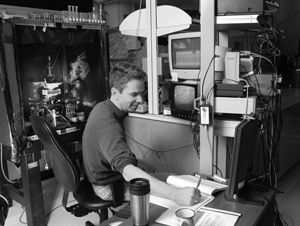 UNMC researcher Wallace Thoreson, Ph.D., answers questions about his work, life and interests.
UNMC researcher Wallace Thoreson, Ph.D., answers questions about his work, life and interests.
NOTE: This profile is part of a series highlighting the 25 researchers who were named UNMC Distinguished Scientists for 2006. Each of these researchers will be profiled in UNMC Today leading up to a March 12 ceremony to recognize their achievements.
- Name: Wallace Thoreson, Ph.D.
- Title: Professor, ophthalmology and visual sciences and pharmacology and experimental neuroscience, College of Medicine
- Joined UNMC: 1993
- Hometown: Columbia, Mo.
Describe your research in 25 words or less.
I am primarily interested in understanding the mechanisms by which light is converted into vision by the retina.
How did you decide to pursue this area of research?
I began graduate school interested in studying insect pheromone receptors. However, there was no one in entomology at the University of Minnesota qualified to teach the electrophysiological techniques I needed to conduct those studies. Therefore, I switched to the study of vertebrate physiology and a different sensory receptor — the eye.
When did you realize you were interested in research?
While working in a small research laboratory doing electrophysiological recordings from the cockroach cercal sense organ as an undergraduate at Carleton College.
What are the greatest challenges in research today?
Perhaps the greatest scientific challenge is to understand how multiple, diverse signaling pathways are coordinated within and between cells. The greatest administrative challenge is to manage time effectively and continue to get grants in a time of declining government support for science.
Best advice for new researchers?
To pursue research questions that you find exciting.
When an experiment stalls, what drives you to continue on?
Persistence and curiosity.
Who has been your greatest teacher?
Dwight Burkhardt, my Ph.D. advisor at the University of Minnesota. His intellect, integrity and support are an inspiration.
Tell us about your family and hobbies outside the lab.
I get out and enjoy nature by hiking, fishing and camping with my wife, 17-year-old son and 14-year-old daughter. We enjoy watching Creighton University soccer and basketball games. I read fiction (particularly science fiction and mysteries), poetry and history. And I enjoy listening to music.
Globally, describe the most notable research achievement ever?
The most notable research achievement in biology is the discovery of evolution since it is the central principle upon which the field of biology is based.
Clarify a common misconception about research?
When used by scientists, the term “theory” is reserved for ideas that have been extensively validated by experiments. For example, we refer to the theory of evolution or the theory of gravity because these have been exhaustively proven. By contrast, we use the term hypothesis for ideas that still need experimental verification. Certain individuals exploit this use of terminology to imply that significant questions remain about whether evolution has occurred. Saying that evolution is “only a theory” is akin to saying that gravity is “only a theory.”
What would you tell a student interested in a research career?
I didn’t choose research because I thought it was necessarily the best career I could have chosen but rather because it was the only career that I could imagine myself having.
List three things few people know about you.
- From hours spent poring over Golden Nature Guides as a boy, I can identify every common butterfly, rock and mineral in the United States;
- I enjoy going to Sokol Underground and other local clubs to see “indie rock” bands; and
- I carry a colorful wallet made of duct tape.